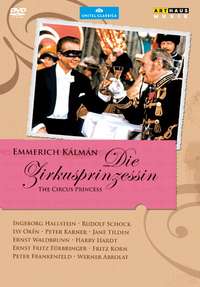|
Back
03/24/2012
Emmerich Kálmán: Die Zirkusprinzessin
Ingeborg Hallstein (Princess Fedora Palinska), Rudolf Schock (Mister X), Isy Orén (Mabel Gibson), Peter Karner (Toni Schlumberger), Jane Tilden (Carla Schlumberger), Ernst Fritz Fürbringer (Prince Sergius), Ernst Waldbrunn (Pelikan), Harry Hardt (Director Baranski), Fritz Korn (Adjutant), Peter Frankenfeld (Pinelli), Werner Abrolat (Count Saskusin), Viola Wahlen (Gesellschafterin), Symphony Orchestra Kurt Graunke (Munich), Werner Schmidt-Boelcke (Musical Director), Manfred R. Köhler (Director), Helmut Brielmann (Production Manager), Hannes Schindler/Rainer Moelter (Camera), Horst Henicke (Set Designer), Helga Pinnow (Costume Designer), Heinz Schmiedel (Choreography), Hans Endrulat/Hans-J. Richter (Sound Manager)
A production of Accord Film GMBH © Unitel Classica (1969) – 111 min.
Arthaus Musik Ref #: NTSC 101 596 – Booklet in English and German. Subtitles available in English, German and French

   
Gold and silver, the precious commodities of tangible wealth, are two words which give good cause to use when describing those momentous years when a lighter fare of entertainment popped up in Europe and America. The “golden age” of operetta began in the late 19th century with contributions by Carl Millöcker, Franz von Suppé and the heavily venerated Johann Strauss Jr. which was followed by the “silver era” in the early 20th century. This second wave, dominated by the Hungarian tripartite of Franz Lehár, Emmerich Kálmán and Paul Ábrahám, kept wind in the sails by dazzling audiences with sparkling music, lively dancing and comedic acting.
Premiering on March 26, 1926 at the Theater an der Wien, Die Zirkusprinzessin was one of the many successful works penned by Emmerich Kálmán. Like a dash of paprika, Kálmán’s recipe called for a sprinkling of Hungarian zest to spice up his works. Following the disasters of World War I (1914-1918), the Golden Twenties saw a schism within the musical world with the advent of avante-garde experimentations on one hand and perpetuation of past traditions on the other. Operetta writers also had an affinity for creating innovative and original material, and librettists Julius Brammer and Alfred Grünwald were no different. The impetus for their new text came after they purportedly saw a circus acrobat by the name of Mister X.
Under the direction of Manfred R. Köhler, the operetta film is chock full of punchy numbers, zany antics, mushy romanticism and bubbly music. In today’s high tech world of Blu-Ray, HD and surround sound, it’s difficult to rewind to days of inferior cinematic capabilities; however, in context of film novelties of 1969 Die Zirkusprinzessin incorporates a plentitude of artistic achievements that deserve merit.
The circus master’s opening quasi-bizarrerie dialogue, reminiscent of Joel Grey’s The Emcee in Cabaret, presents the acts to come, introducing us to live Lipizzaner stallions and Indian elephants (actual performances of Die Zirkusprinzessin were always set outside the tent because they would not be able to perform live acrobatics.) Mister X’s trapeze stunts are genuine (likely using a stuntman although blatantly edited) as is Mabel Gibson’s (Isy Orén) ridiculous tightrope where she clumsily falls off the wire (which lies only two feet from the ground.) Ingeborg Hallstein as the Russian Princess Fedora Palinska exudes sophistication and decorum, a classy Audrey Hepburn. Jane Tilden’s Carla Schlumberger traipses around her palace smoking a stogy while she embarks on a hilarious standup comedy routine with her longtime indentured servant, Pelikan, played by Ernst Waldbrunn. Rudolf Schock as Mister X has a few unconvincing sentimental moments that make us think we’re back to ‘Vesti la giubba’ from Leoncavallo’s Pagliacci.
It’s fairly easy to separate the operetta’s three acts within the film. Helga Pinnow’s costuming is richly detailed, and her extravagance is highly visible in the ballroom scenes where she dresses Russian aristocrats with imperial flair. Horst Hennicke has a marvelous scrutiny for set detail and the choreography by Heinz Schmeidel is clever and never static.
Despite the sound dubbing, Die Zirkusprinzessin is an enjoyable journey back to the heyday of Viennese operetta.
Christie Grimstad
|